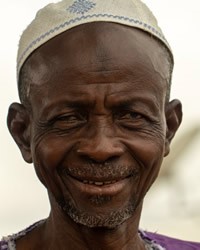Hausa in Gambia

Photo Source:
Erik Laursen, New Covenant Missions
|
Send Joshua Project a map of this people group.
|
| People Name: | Hausa |
| Country: | Gambia |
| 10/40 Window: | Yes |
| Population: | 13,000 |
| World Population: | 59,120,000 |
| Primary Language: | Hausa |
| Primary Religion: | Islam |
| Christian Adherents: | 0.50 % |
| Evangelicals: | 0.20 % |
| Scripture: | Complete Bible |
| Ministry Resources: | Yes |
| Jesus Film: | Yes |
| Audio Recordings: | Yes |
| People Cluster: | Hausa |
| Affinity Bloc: | Sub-Saharan Peoples |
| Progress Level: |
|
Introduction / History
The Hausa are the largest ethnic group in all of West Africa.
By 1500, Islam had been introduced to the Hausa by traders. Many of the urban Hausa embraced it right away, in hopes of enhancing their businesses. However, the villagers were not as receptive to this new religion.
In the "holy wars" of 1804 and 1808, the Hausa were conquered by the Fulani, their strongly Islamic neighbors. They were made slaves until the early 1900s. At that time, many of the villagers were either forced or bribed into becoming Muslim. They adopted some of Islam's basic outward behaviors and rituals but did not "sell out" as many of the urban Hausa did. For that reason, many of the rural Hausa today are only superficially Muslim.
The Hausa are originally from an area known as "Hausaland," a region covering 75,000 square miles and straddling the borders of Niger and Nigeria. Because they are a people of trade, the Hausas have migrated to other parts of West Africa including Gambia. Hausa traders, Muslim priests, and Hausa-speaking slaves helped to spread Hausa culture. The Hausa in West Africa have been heavily involved in long distance trading for centuries. Traders exchanged gold from the Middle East for leather, crafts, and food. Hausa became the language of Muslims and of trade.
Where Are they Located?
The Hausas live in the western Sub-Saharan countries, including tiny Gambia. They are especially concentrated in northern Nigeria and Niger.
What Are Their Lives Like?
Some of the Hausas have become very rich through regional trade. They are deeply involved in the politics of their communities. Others struggle with basic needs like clean water.
The Hausa people have a restricted dress code related to their Muslim religious beliefs. The men are easily recognizable because of their elaborate dress which is a large flowing gown known as Babban riga and a robe called a jalabia. These large flowing gowns usually feature some elaborate embroidery designs around the neck. The women can be identified by wrappers called zani, made with colorful cloth atampa, accompanied by a matching blouse, head tie, and shawl.
Hausa buildings are characterized by the use of dry mud bricks in cubic structures, multi-storied buildings for the social elite, the use of parapets related to their military/fortress building past, and traditional white stucco and plaster for house fronts. At times the facades may be decorated with various abstract relief designs, sometimes painted in vivid colors to convey information about the occupant.
What Are Their Beliefs?
By 1500, Islam had been introduced to the Hausa by traders. Many of the urban Hausa embraced it right away, in hopes of enhancing their businesses. However, rural villagers were not as receptive to this new religion. These villagers, then and now, might be Muslim in name only, but their identity is in their traditional religion.
What Are Their Needs?
The Hausa culture is strongly linked to Islam, which makes it difficult to reach this people group with the gospel. There has been intense persecution of Christian Hausa.
Because Islam has been carried throughout West Africa by Hausa traders and priests, nearly everyone expects a Hausa to be Muslim. This could be one of the main reasons why the Hausa stay so resistant to the Gospel and have difficulty leaving their Islamic faith.
Thank God for the Hausa Bible and the powerful impact that the Holy Scriptures has upon Muslims.
Prayer Points
Pray for his kingdom to come and his will to be done among the Hausa people.
Pray for a movement of Hausa households in Gambia to study the Bible and accept the blessings of Christ.
Pray for a spiritual hunger that will drive the Hausa people to the arms of Jesus.
Pray for workers who are filled with the fruit and the power of the Holy Spirit to go to the Hausa people.